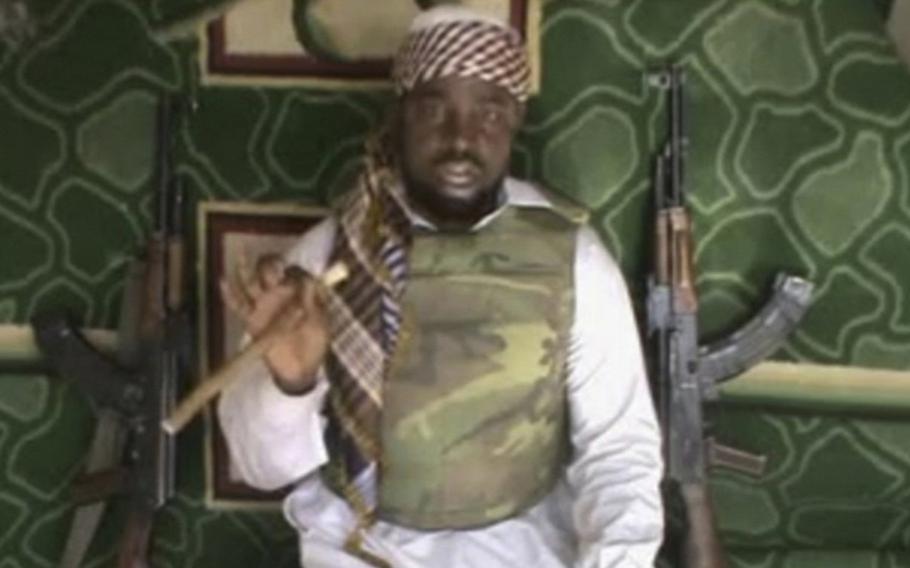
This file image made available Wednesday, Jan. 10, 2012, taken from video posted by Boko Haram sympathizers, shows the leader of the radical Islamist sect Imam Abubakar Shekau. Boko Haram has claimed responsibility for the April 15, 2014, mass abduction of nearly 300 teenage schoolgirls in northeast Nigeria. (AP)
WASHINGTON — The Pentagon on Wednesday unveiled its plans to help rescue more than 200 girls who were kidnapped by Islamic militants in Nigeria.
At the direction of the White House, the U.S. military will send a small team of experts to the embassy in Abuja, Nigeria’s capital, to form an interagency “coordination and assessment cell” that will work the Nigerian government to locate and free the teenagers who were abducted from their school by Boko Haram last month, Pentagon spokesman Col. Steve Warren told reporters.
The U.S. military team will consist of fewer than 10 uniformed military personnel, who will advise and assist the Nigerians with communications, logistics, and intelligence, according to Warren.
Warren would not say whether the U.S. will send surveillance drones to Nigeria to search for the girls, but did say that the “we are discussing with the Nigerian government any type of information sharing arrangements that we can — that we can agree to.”
The Defense Department does not have any intention of using American special operations forces against Boko Haram to liberate their captives, according to Warren.
“[The team’s] mission there is to simply assess and advise … At this time we are not considering a U.S. operation to help rescue the girls,” he said.
The advisory team will augment the existing U.S. military presence in Nigeria. There are currently about 50 American troops stationed at the embassy in Abuja, including embassy security, Office of Military Cooperation and defense attache staff. There are also 20 U.S. Marines temporarily in country participating in training exercises, according to Warren.
The Marines won’t be part of the efforts to help the Nigerians find the abducted girls, but the other U.S. servicemembers will.
“Everyone is working towards trying to find these girls. This is a horrible event and it’s a tragedy,” Warren said. “All U.S. military personnel [at the embassy] in Nigeria will help contribute to the efforts to find these girls.”
Warren said AFRICOM stood up a crisis response planning cell after the kidnappings occurred, and U.S. troops in Nigeria have been “doing what they were capable of doing” up to this point.
Boko Haram was designated a terrorist organization by the U.S. State Department last year. The group has links to al-Qaida and is responsible for thousands of deaths in Nigeria over the past several years, according to the State Department. The militants have previously targeted civilians in their attacks, including women and children.
Abubakar Shekau, the leader of the group, has reportedly threatened to sell the girls to human traffickers.
“These girls were captured and kidnapped 22 days ago and time is of the essence,” White House Press Secretary Jay Carney told reporters Tuesday. “Appropriate action must be taken to locate and to free these young women before they are trafficked or killed.”
Some lawmakers are pushing the Obama administration to take a stronger approach. Rep. Ed Royce, R-Calif., the chairman of the House Foreign Affairs Committee, announced that he will hold a hearing to examine the administration’s response to the kidnappings and to the threat posed by Boko Haram.
In a letter sent to Secretary of Defense Chuck Hagel and Secretary of State John Kerry on Wednesday, Royce criticized the administration’s approach as shortsighted.
“While I welcome the Administration’s efforts in response to the kidnapping, including offering a team of military and law enforcement officials to the Nigerian government, I believe this temporary response will not sufficiently combat Boko Haram’s long-term threat to the region and U.S. interests,” he wrote.
Royce argued that the U.S. government needs to develop a “strategic, multifaceted approach” to help Nigeria combat the militants, including more robust security assistance and intelligence sharing with Nigeria, and better coordination with other countries in the region to thwart the group’s cross-border activities.
“It is clear that a piecemeal approach to Boko Haram, with limited U.S. military involvement, has been ineffective to date,’ Royce said in the letter. “A more aggressive U.S. commitment against al-Qaeda affiliated Boko Haram is overdue.”
harper.jon@stripes.com Twitter: @JHarperStripes